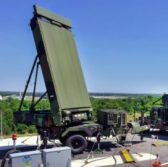
The U.S. Marine Corps has received an active electronically scanned array radar system Northrop Grumman equipped with a gallium nitride antenna and designed to help the service branch monitor threats in real time.
Northrop said Thursday delivery of the AN/TPS-80 Ground/Air Task-Oriented Radar with GaN technology came after the company handed six G/ATORs over to the service branch in early 2017.
The system is built to provide warfighters a 360-degree coverage area and detect fixed-wing aircraft, unmanned autonomous systems, helicopters, cruise missiles, rockets, mortars and artillery.
G/ATOR also includes a cyber and digital beam forming technology designed to support radar operation across multimission activities.
The Marine Corps ordered nine low-rate initial production radars from Northrop through a $375.6 million contract in 2016.




